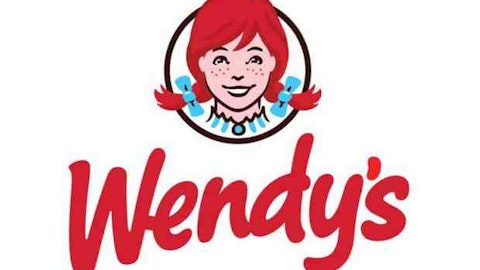Value investors are constantly on the prowl for companies with huge growth potential, but it is not always easy finding one that is safe enough for a large investment. These plays are often made on speculation and carry smaller investments, which, in turn, makes for smaller capital gains. However, when you find a company with established brands, high earnings growth, and a dividend to boot, you have found a yourself an absolute goldmine. Dunkin Brands Group Inc (NASDAQ:DNKN)fits this description and has had a big run over the last year, but the earnings expectations predict this is only the beginning.
The brands
Dunkin Brands Group Inc (NASDAQ:DNKN) owns, operates, and franchises quick service restaurants under the Dunkin’ Donuts and Baskin-Robbins brands. Dunkin’ Donuts is the world’s largest coffee and baked goods restaurant and Baskin-Robbins is the world’s largest specialty ice cream chain. Being home to two of the world’s leading brands gives Dunkin Brands Group Inc (NASDAQ:DNKN) an edge in the industry.

Last quarter
On July 25, Dunkin Brands Group Inc (NASDAQ:DNKN) reported second quarter earnings and the results were mixed, but impressive.
| Reported | Expected | |
| EPS | $0.41 | $0.40 |
| Revenue | $182.49 million | $183.09 million |
Earnings per share and revenue rose 24.2% and 5.9% respectively, while quarterly profit soared to $40.8 million from just $18.5 year over year. The highlight of this report was the higher-than-expected domestic same-store sales; Dunkin’ Donuts increased 4% and Baskin-Robbin’s increased 2.6%. The increased sales were not from higher prices, but from a rise in the average ticket by its customers; this can be credited to the constant innovations driven by consumer demand.
The wild wild West
With more than 7,000 Dunkin’ Donuts locations in North America, shockingly there are zero in the western United States. Baskin-Robbins has been very successful in this area, but its sister brand never made its way over. However, this is set to change very soon. On July 25, Dunkin’ reported its deal with 4 franchise groups to open 45 restaurants in California in 2015, just weeks after the first deal for 18 restaurants was signed. California is only the beginning as Dunkin’ Brands has a long-term goal of having over 15,000 locations in the United States. This projected store count would more than double its domestic royalty income, cause a spike in franchise fees, and provide more capital toward marketing and adding company-owned locations. Expansion and innovation are two core characteristics of great companies.
Future expectations
In its second quarter report, Dunkin Brands Group Inc (NASDAQ:DNKN) projects earnings per share to be between $1.50-$1.53 in 2013, in line with analyst expectations. This growth is not expected to slow up anytime soon either. Take a look at the earnings projections, provided by TD Ameritrade, through 2015:

2013: 19.5% growth
2014: 19% growth
2015: 18.7% growth
According to Yahoo! Finance, the industry average price-to-earnings multiple of restaurants companies is 27.17. This means that if Dunkin’ Brands were to trade at the industry average multiple in 2015, the stock would surpass $58 per share. However, with expansion being ignited in the West in 2015, it has the potential to continue trading at its current multiple of 36; this would propel the stock well beyond $75 per share. Potential gains like these cause value investors to salivate.
Return to shareholders
Dunkin’ currently pays a $0.19 quarterly dividend, resulting in a yield of roughly 1.8% annually. It was increased from $0.15 in 2012, so there is a strong possibility for more raises in the future, as long as free cash flow continues to rise. Healthy dividends are hard to find in high-growth companies.
In the second quarter, Dunkin Brands Group Inc (NASDAQ:DNKN) repurchased approximately 400,000 shares of its common stock. There is another $33 million remaining for repurchases under previous buyback authorizations. By reducing the share count, earnings per share will increase, making the remaining shares more valuable.
Dividends and share repurchases are two of the most bullish moves a management team can make and both dramatically benefit shareholders. With management expecting $125 to $135 million in free cash flow for fiscal 2013, the dividend could be increased and another round of repurchases could be authorized.




